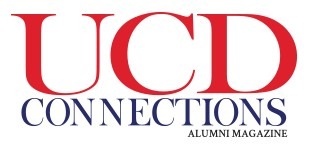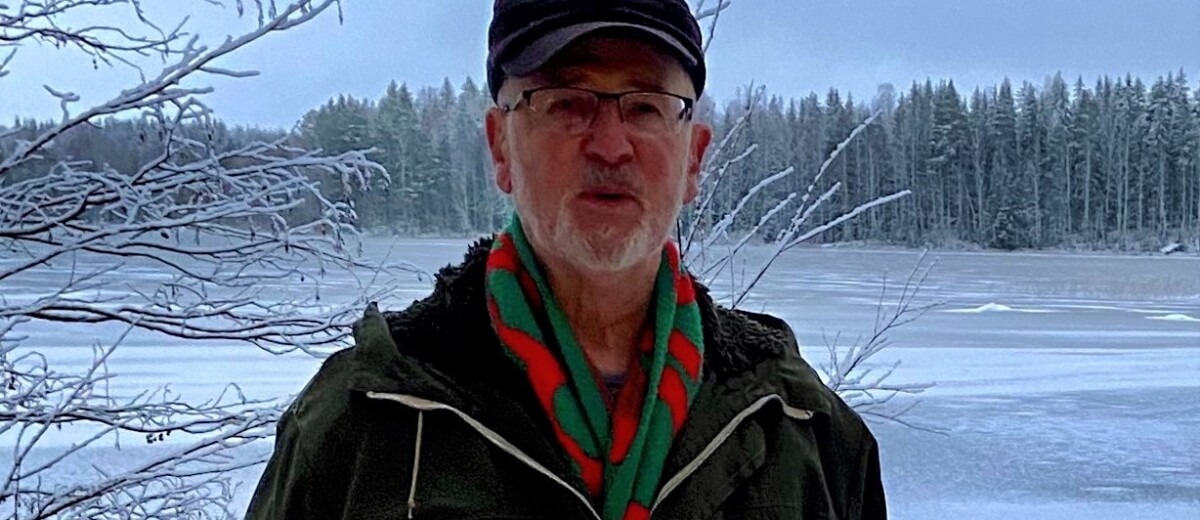2020 marked the 50th anniversary of Michael Coleman’s graduation from UCD with a BA in History. Michael retired from a successful academic career at The University of Jyväskylä in Finland in 2010. He is the author of the book “American Indians, the Irish, and Government Schooling: A Comparative Study”. He lives in Finland with his wife Sirkka.
1.Finland is very much your home now, what brought you there?
Honestly, I went to Finland to meet girls – on my summer break from UCD in 1969. A year later I found myself, the most Dub of all Dubs, working on a Finnish farm married to the farmer’s daughter!
2. What is daily life like there?
Finland has been very good to me. It gave me my wonderful wife, three children (now 46, 43, and 41) and four wonderful grandchildren. It is certainly one of the best countries in the world to raise children in.
The University of Jyväskylä not only gave me a deputy lectureship in 1970 – but tenure in 1972! So over the years I have been fortunate enough to get leaves of absence to study/research in the United States and Ireland! Since 2004 I have been a proud dual citizen of Finland and Ireland. Don’t ask me who I cheered for in the recent Ireland-Finland soccer matches though – I won’t tell you.
The daily life of a relatively-privileged retiree (since 2010) is good – except for the Finnish winter. But I try to look on the white – I mean bright – side: there’s only six months of snow/ice/SLIPPERY paths each year.
My song:
“Wish I were a bear, what a delight,
To turn the winter into just one single night.
Snuggle up warm in my leafy cave,
Think of all the misery that would save…”
3. What do you miss most about Ireland?
I miss family and friends, of course. I do not romanticise the country I grew up in, but there is not a moment of my life that I’m not consumed by homesickness. I was lucky enough to spend a year in the 1990s as part of my work as a Senior Fellow of the Academy of Finland, completing research on my 3rd book.
In my next life, if I don’t go down, I’ll wander Ireland as a spirit – not a nasty, haunting one but a benevolent one – just going to Dalkey (my father’s home), Booterstown strand, Grafton Street, Earlsfort Tce., Belfield, Kiltimagh, Co. Mayo (my mother’s home)…wandering Ireland forever….and not worry about damp, draughty houses or poor central heating. (I may have got this wonderful idea of eternity in Ireland from the song, Galway Bay.)
4. What was your UCD experience like – the social scene, classes, lecturers?
I arrived rather late, at 21 – following a lost job and career in advertising. Great social scene! Although a life-long teetotaller (“where did we go wrong with you?” my father once asked, only half-jokingly), I enjoyed dropping in with the gang at the local pub every evening after class and I am still in touch with some of them.
At UCD I first learned powerfully that history, especially Irish history is not a matter of good guys/bad guys. It is always complicated, “an argument without end”. This stimulated me into becoming a historian, especially of education. Have a dekko of my third and last book, focusing on the 1820-1920 period, probably in a UCD library: American Indians, the Irish and Government Schooling a Comparative Study (Lincoln: University of Nebraska Press, 2007.
Ironically, I spent most of the first few decades of my life wishing I could get out of school, which I really did not enjoy (especially mathematics!); then I spent the next four decades trying to get back in as a historian! I believe I was one of the first to examine assimilationist schooling from the perspectives of children and their families. What was it like to be a little Indian boy or girl taken, often against parents’ wishes, into a missionary or United States government school? Or a young Blasket Islander, monolingual in Irish, sent to the new, then English-only, National Schools after 1831? It was a challenge to investigate such cultural and personal experiences for four decades of professional life.
5. What is your fondest memory from your time at UCD?
Both socially and intellectually, attending UCD was a deeply rewarding experience. So much so I inspired my son, Markus, to attend too! He came all the way from Finland to do his BA at UCD!
6. What led you to academia?
My parents were extremely interested in history, especially in exotic cultures like Ancient Egypt and modern Tibet and my father was fascinated by the American West. It was from him that I heard the first words critical of white mistreatment of Indian peoples. My PhD and first 2 books examined Indian-White American interactions. So, when, to my great surprise, I was fired from my job as a commercial artist, my parents suggested I go back to “school” – to university!
7. What interested you the most about your work?
I’ve been retired for a decade now so I have to look up “job” in the dictionary. As a lecturer and later professor in the Language Department of the University of Jyväskylä, I greatly enjoyed my endless interactions with Finnish and visiting students, in lectures, tutorials, seminars, and thesis direction.
Above all I tried to encourage them not to accept the words of “the book,” or my words – but to analyse and think critically on all issues. I also enjoyed cracking jokes. In an anonymous questionnaire reply a student wrote: “Your jokes are crap, but keep them coming.” My life’s work was not wasted! Actually in 2008 I was named Teacher of the Year at the university – I am still gobsmacked!
8. How has your career impacted the way in which you see the world?
I try to “think critically” and analytically myself, but never cynically. I try to be open to different cultures and experiences.
9. Who are the most interesting or helpful mentors or advisors that you have had?
Many at UCD, especially Dr W.H.A. “Bill” Williams – we still keep in touch. And the late Prof F. X. Martin. Also Prof Charles Rosenberg, doctoral mentor at the University of Pennsylvania.
10. What advice would you give to someone who is just beginning their career?
Work hard and seek advice. At some point ask whether this is the career you want. If you are living overseas, try to learn and use the local language. I tell people I speak Finnish like a native – of Dublin. But I do speak it every day, though reading is more difficult. I accidentally became a university teacher. My Finnish wife-to-be and I were figuring out how to go about life together, when she, a student, heard that her English Department at the University of Jyväskylä needed a deputy lecturer for the 1970-71 year. We got married on a Sunday in 1970 and I began teaching in a language laboratory the next morning. Sirkka went on to teach high school English, French, and Spanish – and became an ambassador of culture for her Finnish and visiting foreign students and teachers.
11. What are the rules you live by?
Love, truth, emotional empathy and critical thinking and the essential equality of all human beings. (If I were an American Indian, I might write “of all living things and of the very earth itself). I try to be a good human being and to understand, but not judge or rank cultures.
12. What are some of your favorite books or films?
So many, so many! A firm favourite though is Dee Brown, Bury my Heart at Wounded Knee (1970); Vine Deloria Jr’s Custer Died for your Sins: an Indian Manifesto (1969) – gave a shockingly different and mind-opening understanding between American Indian and white interactions. Blew me away! And I enjoy anything from Edna O’Brien, Elena Ferrante, John Banville, Sally Rooney & fellow alums John McGahern, Roddy Doyle & Maeve Binchy.
As for films, The Life of Brian, the first Star Wars film, Dr Strangelove and The Piano.
13. Finally, do you have any wisdom or advice to impart?
Don’t give up easily (my first book was rejected 6 times before acceptance). But do not be a perfectionist. At some point decide – this is enough for now. Seek all sorts of critical advice, but make up your own mind. If you have a choice, and you sometimes have, don’t try to do too many things. Above all, learn from others, but never envy another human being. Finally, try not to repeat yourself too often. (Let me repeat…..do not repeat yourself).

